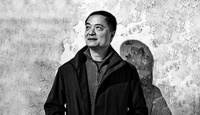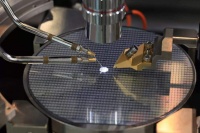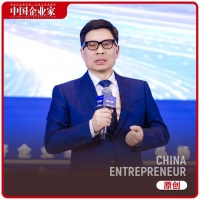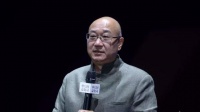和自动驾驶大佬聊聊:谷歌、特斯拉、滴滴自动驾驶哪家强?【下集DannyPal 03】
编者按:本文来自微信公众号“DannyData小丹尼”(ID:dannyteam),作者:小丹尼,36氪经授权发布。
我是小丹尼,谈车说科技。在上集DannyPal《和自动驾驶大佬聊聊》视频结尾,电动Emma向大卫抛出了一个有趣又敏感的问题:“大卫分析了半天谷歌、特斯拉、滴滴等公司的各种自动驾驶发展路径,又说中国交通情况相比美国复杂,那大卫你作为自动驾驶一线从业者,他准备怎么在中国搞自动驾驶呢?我作为一个“看热闹不怕事大”的主持人,非常期待围观大卫如何回答电动Emma这个犀利问题,来,我们一起围观。
I'm Danny. I talk about cars and tech. At the end of the last episode of DannyPal's video, Emma asked David an interesting and sensitive question: David has analyzed the various development paths of Google, Tesla, Didi and others, and said that the traffic situation in China is more complicated compared to the U.S. So David, as a front-line practitioner in the autonomous driving field, how are you going to develop the autonomous driving tech in China? As the host of the show, I'm looking forward to seeing how David will answer Emma's question. Let's go watch.
电动Emma:
所以你准备怎么搞,你作为从业者?
So what's your plan as a practitioner?
David:
That's good question。我们实际上还是要针对中国这样的模式,把城市里面的大部分问题解决掉,同时再把这样的技术出口或者说转化给新兴城市。就是说如果中国有某个城市,从交通灯到人行线,都跟你自动驾驶,为了你而改变,那就比较好。但是我们不会奔着这个方向去做方案,因为这样就相当于直接把方案阉割了一部分。我们还是会奔着在没有任何外力的情况下,这个单车智能是怎么样的,奔着这个方向去的。
In fact, we still need to solve most of the problems in the cities of China. Then at the same time, we can export or transform this technology to the emerging cities. That is to say, if there is a city in China, let’s say, from traffic lights to sidewalks can all be changed for the autonomous driving. We're not going to run to this approach because it would cut off a part of the solution. We're still going to work on the one-car intelligence without any external force. We’re heading to this direction.
电动Emma:
明白。我就想问一下,为什么全世界都这样。比如说在美国硅谷,有特别多的自动驾驶公司,它就变成了自动驾驶的风暴中心,然后在中国可能就是广东。为什么就这两个地方跑出来了?
I understand that. I want to ask why this is the trend all over the world. For example, there will be many self-driving companies in Silicon Valley in the United States. It becomes a storm center for autonomous driving. Then in China, Guangdong is that type of center. Why are these two places standing out?
David:
北京的小伙伴就不乐意了,北京也有这些公司对吧?
People in Beijing are not happy anymore. Beijing says there are still many companies.
电动Emma:
我又打脸了。
My fault.
David:
我明白你的问题的意思,就是说为什么会有一个产业集群?这个产业集群可以在任何一个行业。我们先拿美国举例子。为什么做金融,做对冲基金的都在华尔街或者Connecticut的某个地方?为什么拍电影都在LA?为什么做海上石油的都在聚集在休斯顿?
I understand the question you are trying to ask; you mean, why there are industrial clusters? This industrial cluster can be in any industry. Let's take the United States as an example of why all financial hedge funds are on Wall Street or somewhere in Connecticut. Why filming in LA? Why do the offshore oil gather in Houston?
电动Emma:
为什么厉害的人都在DannyData对吧?
Why many awesome people are at DannyData, right?
David:
为什么会有这样的一个产业集群?这跟这个城市当年来的那拨人是有关系的。 在中国,实际上现在做自动驾驶的这些公司,也是从像百度这样的头部企业分化出来的,分化出来的这些人落在哪里了,哪里就有这样的公司,跟美国还不太一样。美国是在不同的城市做不同的事情,造飞机的可能在Seattle,做海洋石油的可能在休斯顿。中国不是的,中国大部分都集中在这几个城市,而这几个城市都是由原来的,不管是国有企业也好,还是像BAT这样的私营企业也好,这些大公司流出来的人做了这么一个事情,这些人在哪里,这个产业就在哪里。
Why there are the industrial clusters? That has something to do with the people in those cities. However, in China, these companies focus on autonomous driving from those leading companies like Baidu. It depends on where these companies' employees stay; then, we will know the location of those companies. Not quite the same as the United States. In the United States, those companies did different things are in different cities. The companies which are building planes are in Seattle, right? The companies are working on offshore oil in Houston. China is not like that; most of China famous companies are concentrated in these cities. And these cities are made up of these original big state-owned enterprises or private enterprises like BAT. Those people who come out from those companies, then they try to do something new. That industry will take location in the place where are these people stay.
电动Emma:
我们私下聊天的时候,你说了一个特别有意思的观点,就好像美国是一个把地方做成一个产业的名字。比如说我们说起电影就会说好莱坞,对吧? 我们说起金融,我们就会说华尔街;我们说起科技,我们就说硅谷。这个的确是很有意思。然后因为美国有了这种模式,我们中国现在也有,比如说中关村什么的。
When we talked in private, you mentioned a particularly interesting point. The United States makes a place a representative place of an industry. For example, when we talk about movies, we think of Hollywood. Wall Street is linked to finance. Speaking of technology, we will think of Silicon Valley. This is indeed very interesting. China actually has this similar model because of the United States. For example, we have Zhongguancun etc..
David:
我觉得深圳的华强北就很有代表性。一说搞电子零部件,以这个起家的,大家都容易想到华强北。虽然华强北这个地方现在在深圳可能已经比较黄了,就像现在,中关村海龙和鼎好大厦也不怎么卖产品了,但是他当年的集群效果产生的溢出效应还是摆在那里的。莆田是另外一回事,莆田是人家从村里走出来, 我们是集中到一个村,集中到中关村。
I think the Huaqiangbei business district in Shenzhen is representative. When it comes to starting with electronic components, it is easy for everyone to think of Huaqiangbei. Although the place of Huaqiangbei may have stagnated in Shenzhen now, just like Zhongguancun Hailong and Dinghao Building are not selling products now, the spillover effect of the cluster effect is strong. Putian is another matter. Putian is a group of people who came out of the village. However, we are concentrated into a village, Zhongguancun.
05 硬核拆解每家的自动驾驶模块
The breakdown of the automated driving module
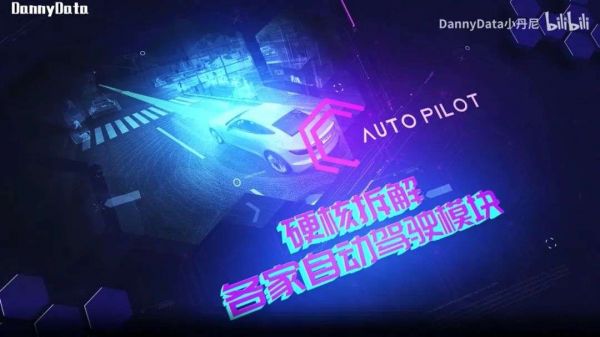
小丹尼:
David,刚才我们聊了很多自动驾驶,但是我看了你之前提供给我的资料,你其实对自动驾驶,无论是软件还是硬件方面,都是非常硬核的,包括我看你把比较头部的自动驾驶模块都拆解出来了,包括Waymo、 Uber ATG还有Cruise的硬件。David你能不能给我们大概介绍一下,这几家公司的特别之处?
Just now we talked a lot about automated driving, but according to the information you provided to me before, you actually have a deep understanding of the software and hardware of automated driving, including that you give us a breakdown of these head automated driving modules to us. David has analyzed Waymo, Uber ATG and these Cruise hardware. David, can you tell us something about the special features of these companies?
David:
Ok。实际上这些公司都是基于多传感器融合。我先举个例子,什么叫多传感器融合? 瞎大爷过马路需要聋大奶奶扶着,这叫多传感器融合。它的本质是利用不同传感器在不同特性特质下的优势。比如说毫米波雷达对于速度的判断是比较准的,但是对于物体属性的判断,没有视觉的准。而视觉也有很多缺陷,视觉对于具体的在三维空间内的坐标,把控得就是不准,就是没有激光雷达准。所以我们就用激光雷达,用点云把具体的位置拿到。
In fact, these companies are based on multi-sensor fusion. Multi-sensor fusion is, for example, the blind grandpa needs the deaf grandma to cross the road. Multi-sensor fusion is actually using the advantages of different sensors under different characteristics. For example, millimeter-wave radar has a relatively accurate judgment on speed, but its judgment on the identity of objects is weaker than that of vision. There are many defects in vision. For the specific coordinates in the three-dimensional space, the visual control of them is more fuzzy than the lidar. So we used lidar to get its specific location with a point cloud.
所以每一家每一个传感器,在物理性能和可以识别的范围都有它的优缺性,你把它combine在一起,基本上在每一个性能指标上都比较好了,不管是远距离近距离,不管可见度在什么情况下。所以从Waymo、Cruise到Uber ATG,包括百度,还有国内这几家公司都是用多传感器融合。
So every sensor of every company has its advantages and disadvantages in physical properties and identifiable range. Then you combine it together. Basically, each performance index is better in terms of its own. Then you combine it together, whether it is long distance, close distance, visibility or other circumstances, basically the combination is better than each alone on every performance index. Range from Waymo, Cruise, Uber ATG, Baidu, and these domestic companies basically use multi-sensor fusion.
在多传感器融合当中,还有比如说多个激光雷达做拼接,一个主激光雷达要负责很多事情。在这方面,每一家还是有不同的技术区别的。如果大家看到Cruise的车,就会发现有5个激光雷达。
Then in the multi-sensor fusion, including multiple lidars, a main lidar is responsible for many things. Each company has different technical differences in this regard. If you see Cruise's car, you will find that there are lidars.
电动Emma:
Cruise是通用的对吧?
Cruise is the project of GM right?
David:
对,通用投资的这家公司。它其实就是用多个机械式的激光雷达和视觉,加上毫米波雷达做的一个拼接。跟它对应的就是像Waymo这样的,一个主传感器在中轴上,所有的这些传感器都做在中轴上,然后边上比如说补盲的雷达来作为辅助。还有一类,像neural AI,在湾区这边的一家初创公司,它其实也是把整个L4的方案平移到了它的小车上,所以这个小车并不简单。这个小车,我们把车顶拿来看,基本上可以按照无人出租车的方式去理解这个车。
Right, this company got GM's investment. It is actually a splicing using multiple mechanical lidar and vision plus millimeter wave radar. Then one of Waymo's main sensors corresponding to it is above the center axis. All these sensors are on the bottom bracket. There is a supplemental radar on the side as an aid. There is also a car made by neural AI, a start-up company in the Bay Area, which actually translated the entire L4 solution to his car. This car is not simple. Let's take a look at his roof. We can understand this car in the same way as an unmanned taxi.
电动Emma:
我看好多弹幕说主播讲得好形象,给你加鸡腿。
A lot of comments say that David‘s examples are very vivid.
David:
聋大爷遇到瞎大奶奶了。
The deaf grandpa met the blind grandma.

电动Emma:
对的。
Yes.
David:
我做这个比喻的时候,我在想好像真的是这样,两个人扶着手过马路,毫米波雷达和激光雷达,几个人扶着手在开自动驾驶。
Two people holding hands across the road are like millimeter wave radar and lidar, and a few people are holding hands to drive automated driving car.
电动Emma:
你这种想法,你对投资人也是这样讲吗?我听我的朋友说,很多时候,在硅谷的投资人其实都是很懂行的,但是可能国内的一些投资人,就不一定对自动驾驶这么懂。你跟他们说的时候他们都能理解吗?
Do you speak the same way to investors about this? I've heard from my friends that investors in Silicon Valley actually know a lot about the industry, but maybe some investors in China don’t necessarily know so much about autonomous driving. Can they understand what you mean?
David:
当然我这么说有点......因为投资人作为我亲爹,对吧,不能得罪爹,他们更喜欢听到的是一个故事。当然每个投资人都喜欢听到故事。我讲一下他们更喜欢听到什么故事。就是说无人出租车这个产业在中国有多大,比如说1万亿,我能拍着胸脯说,我占1%的比例,那就是100亿。投资人一听,1万亿的1%也是100亿,是个百亿级的项目,这个可以投。所以这个时候你就没有必要跟他讲什么特别深入的技术和时间同步空间,他在这个问题上已经听不太进去了。
Well, the investors are my father, right? I can't offend dad. Here's the thing, what they prefer to hear is a story. Of course every investor likes to hear a story, and I'll tell you what story they prefer to hear, which is to say how big is the unmanned taxi industry in China. Let’s say it's 1 trillion, I can be very confident saying that I'll take 1% of it, and that's 10 billion. Once the investors hear this, 1% of 1 trillion is also 10 billion, it's a 10 billion project, this can be invested. So, at this time you don't need to tell him about any particularly in-depth technology and the time synchronizing space. They cannot listen to more than that, you know? They have fallen on deaf ears on this issue.
但是如果你是跟特别硬核的技术投资人讲,他又会问你这个技术怎么变现,他会反过来从底层问。所以一个是站在上面脚不着地,一个是站在底下说,你明天告诉我这东西怎么变钱,这两个问题的方式本身就不太一样。
But if you're speaking to an investor in this particularly hard-core technology, they’re going to ask you again how you're going to realize this technology and make profits. And they’re going from the basis to ask you a question. So one is standing on the top with no feet on the ground, and the other is standing on the bottom asking you to tell them tomorrow how this turns into money. These two questions come from quite different places.
如果我要回答的话,我更倾向于回答第二个问题,就是这个技术怎么变现,所以其实我们公司也是通过把技术打包成一个full stack包,给比如说自动出租车公司,让他头上套着所谓的一个“大帽子”,观众朋友们可以理解为一个“帽子”,让一个车实现自动驾驶。我们是做这个方案输出的,不做运营,也不做跟车辆相关的事情,这个更容易变现一点。所以说白了就是把未来大家想象空间那部分钱先赚了,先把硬件的钱赚了,我不跟你讲什么长远的故事,1万亿市场当中我占1%,不讲这个。我们就讲现在这一堆传感器加我的算法。这有点像Tier1的做法,但跟Tier1还不太一样,因为Tier1是跟车厂打交道的,而我们是跟这些有出租车的运营公司打交道的。
If I have to answer, I'd prefer to answer the second question, which talks about how does this technology monetize? So actually, for our company, we want to put the technology into a full stack package and give access to the auto-taxi companies. To give them a so-called big hat, audience can understand a hat which makes a car to achieve the automated driving. Our work is to figure out this solution, rather than the operation or anything else related to the vehicle. This is a little easier to realize. To put it bluntly, we'll make the money from the future part of people’s imagination. To make money from the hardware first, and I won't tell you any long-term stories. I won’t say anything like “I'm 1% of the 1 trillion market.” Let's just talk about this current bunch of sensors plus my algorithm, kind of like Tier 1, but not quite the same as Tier 1. Because Tier 1 is dealing with the car companies and we're dealing with these operating companies that have taxis.
电动Emma:
所以有一个问题,刚好有一个小伙伴问,未来自动驾驶企业和汽车主机厂的关系是什么?
So there’s a question from our audience, what will the relationship be like between automated driving companies and car OEMs in the future?
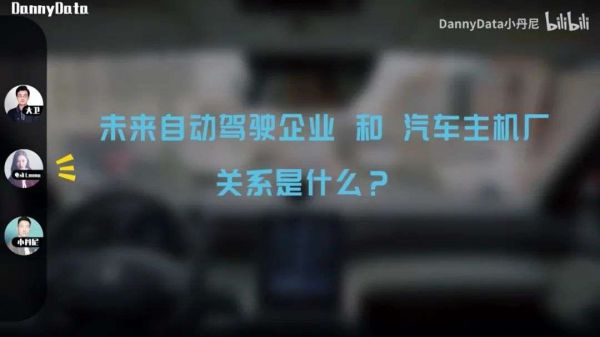
David:
一定不会走得很近,一定是大家还是用钱说话的一个关系。因为主机厂实际上是一个,我们把它理解为电脑组装公司,电脑组装公司怎么可能自己深入到每一个电脑元器件当中去研究,不太可能的。
It won’t be very close since it’s a business relationship. The car OEMs are still working as a computer assembly company according to my understanding. How can an assembly company study every single component? That’s unlikely.
那么自动驾驶公司实际上就是把方案拆分。比如说我现在手里有一个很成熟的方案,叫L4,我把它切成8段,从L2开始一点点喂给你。其实主机厂也很开心,这样他在做广告的时候不用一次all in。如果一次all in,这个客户可能买完这一次就疲劳了。而是一点一点喂给他们,就变成还是像传统这个模式。
Then the autonomous driving company is actually selling the solution piece by piece. For example, I have a very mature solution called L4 in my hand now, I’ll divide it into 8 segments and feed it to the OEMs bit by bit from L2. Actually those companies will be very happy. This way I don't have to be a ll in when advertising. If it’s an all-at-once mode, the customer may get tried quickly and only purchase this one time. Feeding them little by little and this method turns out to be like the traditional one.
电动Emma:
你们都是套路。
You guys have a lot of business tricks.
David:
这个肯定是这样的呀,就跟卖洗发香波是一样的。
That's true and necessary. Just like selling shampoo.
电动Emma:
还有一个问题,有一个叫Data谢(观众名字)的,他问有趣的技术男可以讲讲国内新势力的方案吗?我们刚才说了很多都是国外的,比如说Cruise、Waymo什么的。我不知道你对中国这边,特别是这种造车新势力有什么看法。
Someone asked, can David talk about the new domestic power plan? What we just talked about are mainly foreign, such as Cruise and Waymo. What do you think of China’s new car-making forces?
David:
造车新势力的方案,肯定不来自于造车新势力,肯定来自于它的技术供应商,但是肯定是比做自动驾驶方案的公司要差远了的,但是他肯定用不起自动驾驶方案的公司,而是偏向于用视觉的,所以这个其实没有什么可比性。卖车的公司首先想到的是如何卖车,至于说这个技术到底是怎么样的,它先能给消费者喂一点就喂一点了。它可以先画一个大饼,就说之后是什么样的。而自动驾驶这些公司,比如说百度的阿波罗,还有另外一些从百度分化出来的公司,他们的终极目标实际上是靠这个来卖服务,所以技术一定是要更稳扎稳打的,不太一样,我觉得我也很难一下子回答他的问题。
The plan of the new forces must not come from the new forces of car manufacturing, but from its technology suppliers. But it must be far worse than some companies that do autonomous driving solutions. He certainly can't afford companies with autonomous driving solutions, but prefers to use vision. So this is actually not comparable. The first company that sells cars thinks about how to sell cars. As for the technology, it can be used by consumers first. He can draw a blueprint first and show what it will look like later. Companies such as autonomous driving, such as Baidu's Apollo, and other companies differentiated from Baidu, his ultimate goal is actually to sell services, so his technology must be stable. I find it difficult for me to answer his question at once.
小丹尼:
对,我正好给大家做一个小科普。现在主要有两大路线,一大路线就是使用激光雷达。雷达也是分成三种,主要用的雷达,包括激光雷达、毫米波雷达、超声波雷达。像谷歌用的就是比较偏激光雷达的这个方案。其实是跟David所说的,国内的造车新势力不一样的方案。新势力可能还突出的是第二种方案,就是以视觉为主,就像特斯拉,包括蔚来、理想,他们用的是这种相对来说比激光雷达要便宜一些的视觉方案,对吧?我不知道我这个科普做得对不对?
Yes, I'll just give you a brief introduction, here. Now there are two main routes, and that main route is the use of lidar. Radar is also divided into three kinds, radar is the major one, including lidar, millimeter wave radar, ultrasonic radar. Google, for example, they use more lidar in the program. It's a different scheme from what David said about the new domestic car companies. The new forces may highlight the second solution, that is, they may take the visual as the outstanding point, like Tesla and also NIO, Lixiang. They're using this relatively cheaper solution than the lidar solution, right? I don't know if I'm getting this intro right?
David:
要便宜很多很多才可以。其实大家还要算一笔账,就是一个中国的汽车消费中位数是多少钱?自动驾驶在车上的附加值是多少钱?比如说某个车厂,换一个安全带的颜色就几千块钱,这条安全带就能给这个车厂带来可能5倍到10倍的商业附加值。你用这个逻辑去想一下,一个自动驾驶的套件,能给车厂带来5倍到10倍的一个附加值,并且售价还是在消费者可接受范围内,你想这个技术在Tier1给他的时候,要多便宜才可以。
It has to be much, much cheaper to get it. In fact, we also have to do some math: what is the median spending of a car in China? And how much is the added value of autonomous driving in a car? For example, let's say a certain car manufacturer spends a few thousand dollars to changes the color of a seatbelt, and this seatbelt can bring it maybe 5 to 10 times added value to the business. If you use this logic to think about an autopilot package that can bring 5 to 10 times added value to the car company and the price is within the consumer's acceptable range. How cheap do you think this tech have to be at Tier 1?
这么便宜的技术能做到什么样子,我相信大家心里是有一个数的,还不会是特别特别高级的。跟自动驾驶方案公司比,肯定短时间内是没有办法比的。像Waymo这个方案,我觉得如果算BOM来说也要十几万美金,如果帮车厂再产生10倍的附加值,一百多万,不可能对不对?
I believe we should have an idea of what such a cheap technology can achieve, and it won't be particularly advanced. Compared to an automated driving solution companies, I mean there is certainly no way to compare with them in a short period of time. Because like Waymo's solution, I think if the BOM will cost more than a hundred thousand dollars. Based on this amount of cost, if the solution can help the car factory generating another 10 times the added value, which is over a million. That’s impossible, right?
电动Emma:
他整套系统可能都比整个车要贵了。
The system will cost more than a car.
David:
对的,所以它不是以卖车为目的的。
Yes. So it doesn't aims at selling cars.
电动Emma:
所以在短期,投资人肯定会问你怎么挣钱。比如说对于一辆车,整套系统可能比车还贵,然后像滴滴和Uber,它已经属于运营商里面垄断的了,但是都不能够盈利。
So in the short term, investors will certainly ask you how to make money. For example, if the whole system cost more than a car, and as for Didi and Uber, as we talked before, they have already been the monopoly in the industry, but they are not making profits.
David:
对,所以这个模式是很受怀疑的。我觉得像滴滴这样的公司,我们也不好意思直接这么说了,我们就举个例子,如果这台车的单车成本非常高,那么在中国这样劳动力相对便宜的地方,更不容易实现长期的可持续的商业化。
Yeah, so that model is highly suspect. Like I said, company like Didi. Well, it’s not polite to say that directly, let's just give an example. If this the unit cost of a car is high, it's even less likely to be commercially sustainable in the long term in China where labor is relatively cheap.
那么以我们公司的产品举例子,我们希望能把自动驾驶整个硬件加软件套件加起来打一个包,二三十万,相当于一个全职的专车司机可能一年的工资,这样出租车公司是有可能接受的。但你跟他说这东西一百来万,加上车小两百万,都能买一台顶级跑车了,他不太可能接受。
Taking our products as an example, we hope to package the whole hardware and software of automatic driving, pricing around 200,000 to 300,000 yuan. This is equivalent to a full-time car driver's annual salary. It may be possible that the taxi company will accept it, but if you tell him that it's a million yuan, or two million yuan if the car is included. It's unlikely that it will accept the package.
06 自动驾驶与社会的关系
The relationship between autonomous driving and the society
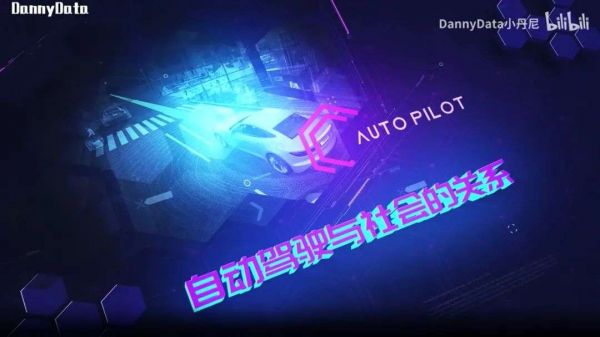
小丹尼:
自动驾驶在中国和在美国的应用,遇到的困难是完全不一样的,对吧?中国可能会更考虑成本价格什么的,因为毕竟人力的价格会更便宜一些,对吧?
The difficulties encountered in the application of autonomous driving in China and in the United States are actually quite different. For example, cost prices will be considered in China. After all, the price of manpower will be cheaper in China, right?
David:
对,美国的客单价还是高的,所以在美国,即使是做无人驾驶小车车的物流,在社区当中做物流,它的单价高,它也比中国更容易回本。
Yes, the unit price of passengers in the United States is higher, so in the United States, even if it is logistics for driverless vehicles and logistics in the community, its unit price is higher and it is easier to pay back.
那天我们还谈到一个问题,在中美两国都有公司做无人出租车、无人大卡车什么的,实际上我们也谈到了,你要看它是增量市场,还是存量市场。在美国的出行实际上是一个增量的。美国家家户户都需要车,因为都住在城乡结合部,我们叫suburbs,其实出行服务是不够的,所以这里面有一个巨大的市场亏空可以去做;但相对来说,物流,因为本来美国开大卡车的就是中低收入群体,还有像拉丁裔的移民,所以你说政府层面他愿不愿意推动,其实他的推动意愿不强,因为这是相当于跟中低收入人群在抢饭碗了。但是如果做出租车,相当于是补充运力的不足,这个是可以的。
In China and the United States, there are companies that make unmanned taxis and people who make unmanned trucks. In fact, we also talked about this. This is one you need to see whether it is an incremental market or an existing market. Travel in the US is actually an incremental market. Every household in the United States needs a car, because they live in the suburbs, and travel services are not enough. So there is a huge deficit in this market. But speaking of logistics, because the United States generally drives large and low-income groups, and these immigrants of Latino are doing. Therefore, the government's willingness to promote it is not strong, because this is equivalent to robbing the middle and low-income people for jobs. Then if the target is taxi, you are equivalent to supplement the lack of travel capacity, this is ok.
那你看这个问题在中国我们怎么去理解?哪一部分是运力比较强的,哪一部分是需要补充的,对吧?
How do we understand this problem in China? Which part is stronger, and which part needs to be supplemented, right?
小丹尼:
在美国的话,其实汽车工会是一个非常大的坎,对吧?
The auto union is actually avery big hurdle in America, right?
David:
嗯。所以在美国,技术有它的先进性,但是还有它温情的一面。有些地方我们说不能吃全鱼,你这个技术本身是为了造福人类的,但是你却反而让这些中低收入群体陷入了另外一个窘境,其实是没有benefit人类。
So in fact, the technology in the US has its advanced nature, but there is also a warm side. That is, we can’t eat the whole fish in some places. Technology itself is set to benefit the mankind, but now, instead, you let these low-and-middle-income people fall into another dilemma. That's not beneficial to all human beings.
电动Emma:
对,所以像欧洲会更极端地保护这种东西,比如说在法国Uber还是不合法的,这种网约车,到现在还是不合法的。
Yes. Europe will protect this kind of things more extremely. For example, Uber is still not legal in France.
David:
这个是可以理解的,实际上。因为一个技术在不同的地区,它落地生根之后,开出的花朵是不一样的。
In fact, this is understandable. When the same technology takes root in different regions, its blooming flowers can be different.
电动Emma:
但他这样其实会很惨,因为中美就会跑得很快,然后你左限制右限制。
This does have negative effects. You will see that China and the US are developing at a fast pace, but they will be limited.
David:
我们回到一个问题,这个问题之前有人问过我,为什么日本的二维码支付怎么怎么不先进,然后日本在哪方面有什么什么落后?我去日本n次了,我一下能抓住朋友问的点。人家本身别的方面非常发达,出门下楼左拐就是711或者小卖部,人家为什么要把这部分革命革掉呢?为什么一定要搞比如说外卖?为什么一定要用你所谓的先进的方式?它本身的那套先进的方式已经让它的人过得很好了,很有尊严了,你不要把它原来那个方式剥离掉,你让他们继续有尊严地生活下去,对吧?技术本身是冰冷的,但是温情的一面在于人怎么调控这个技术,你说非得让这些日本人把他的实体店关了,然后全搞网购吗?或者全搞在线支付?不对的,日本政府是不会做这样的事情的。所以你说像Uber在法国怎么怎么样,法国政府出于保护它的人民的生活福祉,肯定会出一些这样的法案的。
Let's turn to another question. I was constantly asked that why the QR-payment in Japan is not advanced? What's wrong with Japan? I have been to Japan countless times, and I can catch the point of this. In Japan, other aspects are very developed. Convenient stores like 711 are everywhere. They don't need any revolution in this. Is the food delivery service really necessary for them? Why must you use your so-called advanced method to change them? Their own advanced methods have enabled people there to live in a very dignified way. If you stripped off their traditional lifestyle, can you guarantee that your way would be better? The technology itself is cold, but the warm side is how people regulate the technology. Do you have to let these Japanese people shut down his physical store and then engage in online shopping? In other words, it is wrong to engage in online payment. The Japanese government will not do such a thing. So what do you say about Uber in France? Affirming that the French government is out of protecting the well-being of his people, there will be some examples of this. There is a bill.
小丹尼:
我看市场上还有一种论调,就是关于在中国和美国,到底哪边自动驾驶发展会更快一些?有的人觉得中国发展会更快,他们认为中国人对这些创新的事物,天生的接受度就更高一些,就像你要建一个特别大的楼,你不能在一个半成品上去建,这样就不能挖地基,那这样可能会更快一些,我不知道像这种观点,你的感觉......
I noticed there is another argument in this market, that is, where can autonomous driving develop faster, in China or the United States? Some people feels that the development will be faster in China, because Chinese people may be more open-minded for those innovative things. Like, if you want to build a special building, you cannot build on a semi-finished product, because then you cannot lay the foundation, which may be faster, I don’t know. What do you think?
David:
我觉得商业社会,我们还是从商业角度考虑,我们能不能支付得起这个费用。我们即使不拿无人出租车举例子,就拿付费软件举例子。中国人对于技术,如果按照这个网友的理解,接受度很高,中国有哪家公司在付费软件上,真的能赚钱赚得比较舒服的?没有。因为大家认为这个东西贵,不乐意给钱,或者说本身收入水平相对较低,国情摆在这里了。我不认为这个问题是不好理解的。你想中国的平均收入,像李总理说的,1000块钱以下月收入有6亿人,你怎么跟美国比?美国人其实是更愿意为技术掏钱的。那么是一个更愿意为技术掏钱、掏得起钱的地方,容易把技术做成熟,还是说相对来说掏不起钱,或者说在金钱上接受度比较低的地方容易做起来?我相信这个大家自己是有答案的。如果当年的Netflix是在中国,那我估计起不来了。
I think that in a commercial society, we should consider from the commercial point first, which is affordability. We don't even need to use unmanned taxi as the example. Software replacement is enough. According to netizens' understanding, Chinese have higher acceptance, then, do we have a software company who has been making easy money? No. People are unwilling to pay, or that their income level is relatively low. Our national conditions are here. I don’t think this question is difficult to understand. Think about the average income in China, or as Premier Li said, 600 million people live with a monthly income of less than 1,000 yuan. How do you compare with the United States? Americans are more willing to pay for technology. So technology is easier to be mature there. If Netflix was born in China, and I don't think it could succeed.
电动Emma:
有道理,我们可能更多的还是因为钱的方面,如果它能够drive钱下降,我们会很愿意掏钱。
Fair point. Money is a huge problem here. If this technology can drive down the price, we will pay.
David:
对,咱们中国商业模式,这个叫羊毛出在猪身上,这个模式比较适合中国的消费群体。美国不太是这样子,美国就是服务一个技术,就要付费,对吧?两边是不同的方式。
This kind of business model in China should be called: Wool comes out of the pig. America is different. If you used its technology or enjoyed its services, you would pay naturally.
小丹尼:
对,我看有同学留言,白嫖阻碍科技,我觉得说得还挺好。
Right. I saw a comment: Taking advantages hinders technological development. I agree.
David:
绝对是,白嫖绝对阻碍科技发展。白嫖不止阻碍科技发展,还阻碍文化事业的发展,阻碍一切事业的发展,你不想给钱怎么会有优秀的文艺工作者呢?对吧?
Absolutely. Taking advantages definitely hinders the development of science and technology. Not only the development of science and technology, but also the development of culture and any businesses. How can excellent literary and art workers survive without money?
电动Emma:
除非是来听直播。
Unless it's a live show.
小丹尼:
不给钱怎么诞生出优秀的up主,是吧?开玩笑。其实中国的商业模式完全不一样,我非常赞同刚才David说,“白嫖”不只是阻碍科技发展,也阻碍文艺发展。比如说大家都知道,很多歌手在最早的时候非常惨,盗版横行,你辛辛苦苦录一张唱片,结果钱都被盗版挣了,你自己卖不了多少磁带或CD,只能去综艺节目或者是去开演唱会、拍个电影来捞钱,对吧?其实也能理解吧。虽然现在市面上有很多明星演的烂片,但是我觉得也是一个过程,对吧?有的时候他也是不得已之举。
How would there be good content creators without paying, right? Just kidding. Actually in China the business model is completely different. For example, I agree with David that “getting everything for free” are not just a barrier to the technological development but also to the arts. For example, like we all know, some singers actually lived a miserable life in the earliest days. Pirated records are everywhere, and if you work so hard to produce a record but the money will be earned by these pirates. I mean, if you can't sell many of your tapes or CD albums, you can only join in some variety shows or some concerts, right? Or even make a movie to get money. It's understandable. Even though there are a lot of stars shooting many bad movies on the market now, I think it's a process, right? They may have no choice, at times.
David:
对,他如果能拍一个好电影,条件允许他拍个好电影,并且在电影上能赚钱,他何必跑对不对?何必在那装傻?
Yeah, if they can make a good movie, or the conditions allow him to make a good movie and make profits on it, why would they run away, right? Why would they play dumb?
小丹尼:
是的。现在有一些改善了,比如说QQ音乐、网易云音乐,比如说周杰伦发个歌,大家支持一块钱。
Yes. There's been some improvement now, like QQ Music, Netease Cloud Music. For example, Jay Chou releases a song and everyone supports one yuan.
电动Emma:
那没有,我还是看 mv的,mv是不用钱的。
It depends. I still watch MVs, and MVs are free.
小丹尼:
白嫖阻碍周杰伦发歌是吧?
Well, that may hinder Jay Chou releasing new songs.
电动Emma:
现在所谓的智能汽车,连泊个车做不好,那完全的无人驾驶,就是L5级别的无人驾驶什么时候才能够实现?这个是不是一个特别难答的问题?
What is now called the smart car cannot even parking a car well. When will the complete autonomous driving realize? I mean the L5 level. When will that be possible? Is this a particularly difficult question to answer?
David:
这个问题要把它拆一下。 你问一下这位网友是他停车的时候费劲,还是他在高速上开车的时候费劲?肯定是停车的时候费劲。所以整个无人驾驶的大链条当中,要把交通分成大交通和小交通。所谓小交通实际上就是 AVP和APA,自动泊车和停车,这个实际上是作为单独一个课题,在单独做的,是不一样的。我们说的广义上的自动驾驶,是指这个车从A点到B点的这么一件事情,和你在一个区域内找停车位关系不太大。而且在中国停车和在美国停车完全不是一个体验。在美国,傻傻地停在路边,或者停在一个空旷的地方,比如说沃尔玛前面你就直接插进去就行了,反正有的是位置。中国地下停车场绕两圈下去,还得找车位,完全不是一个体验。
This question can be broken down a bit. Do you ask this user if he struggles to park, or if he struggles to drive on the highway? It's definitely a struggle to park. So the whole driverless big chain, to divide the traffic into big traffic and small traffic. The so-called small traffic is actually AVP and APA, that is, automatic parking and parking, this is actually as a separate subject. That’s different. We're talking about autonomous driving in the broadest sense, which is such a thing as this car getting from point A to point B, and this is not really related to the process of looking for a parking space in an area. And parking in China is not at all the same experience as parking in the US. In the U.S., park stupidly on the side of the road, or park in an open space, like in front of a Walmart where you can just stick it in. There's plenty of room anyway. It's not an experience at all when you have to go around the Chinese underground parking lot twice and still have to find a parking space to go around.
电动Emma:
对,还有网友说中国泊车问题还是个停车位的问题,的确是,很复杂。
Yes,there are audience who says that the Chinese parking problem is still parking space problem, and it is, indeed, complicated.
David:
对,所以我们现在聊的其实是解决大交通的问题,小交通实际上对于出租车运营公司也好,对于我们自动驾驶方案公司也好,我们不太关注,因为这个车从大交通回到出发点了,你上一个人把它开到加电站或加油站,帮他加一下油维护一下,这已经省了90%以上的人力了。可能这个问题是需要零部件供应商这样的公司去想的,怎么在一个停车场内做到AVP和APA。自动驾驶公司可能不太会想这个问题。
Right, so what we're talking about now is solving the problem of large traffic. For companies like us at autonomous driving solutions or taxi operating companies, we don’t pay much attention to small traffic. When a car that's coming back to the starting point from the heavy traffic, and you get a guy driving it to a fueling station or gas station to fill it up and maintain it. This has saved over 90% of the manpower. Maybe this is a problem that needs a company like a component supplier to figure out how to do an AVP in a parking lot and APA. The autonomous driving company may not think much of it.
电动Emma:
我还有最后一个问题,这个是我特别想问的,现在SpaceX的星链计划Starlink不是很火吗?有人说这个是特斯拉以后无人驾驶布局的一个大招。David能不能给我们解读一下,这个跟自动驾驶有没有一毛钱关系?
Then I have one last question, which I particularly want to ask. Isn't SpaceX's Starlink project very popular? Then some people said that is a big move for Tesla's future unmanned layout. Can David explain it to us? Does this have anything to do with autonomous driving?
David:
实际上关系不大,我们讲的自动驾驶更多依赖于单车智能,而不依赖于对外部的,不管是5G也好,还是星链也好,关系不是很大。实际上我们所谓的通信、带宽和速度,只能说是把一部分运算外包到了某个地方,但是在自动驾驶这个场景当中,其实不太允许我们把计算这些东西外包,因为你的实施性不可控。你connectivity再好,也偶尔会有间断吧?所以只可能会把比如说高精地图,你下载地图的这件事情外包。你走到某个区域,把下一个区域的地图提前loading来,这个是可以的,但是把车的智能外包不太现实。所以我认为星链这个事情,也许将来它强行绑在一起,能开出什么花来,但是一定不是在这个车的智能上开的花,而可能是在车的生态上面,比如说我在车上想购买什么服务,享有更高的带宽,在车上看YouTube,对吧?
In fact, it doesn’t matter much, because the automated driving we talk about depends more on one-car intelligence than on external ones. For example, whether it is 5G or Starlink, the relationship is not very big, because in fact, our so-called communication, bandwidth and speed can only outsource some of the computing work to a certain place. But in the scenario of autonomous driving, we are not really allowed to outsource these computing work because your implementation is beyond control. No matter how good the connectivity is, there will be occasional breaks. So it is only possible to outsource such things as high-definition maps, you download maps, you go to a certain area, and load the map of the next area in advance. This is possible, but the smart outsourcing of the car is not too realistic.So in fact, I think that the Starlink may be tied together in the future, and what flowers can be bloomed, but it must not be the result of the car’s intelligence, but the ecology of the car that may be based on the ecology of the car.For example, what service do I want to buy and enjoy with higher bandwidth? Watch YouTube in the car, right?
电动Emma:
有一个朋友问:“英伟达的自动驾驶怎么样?我有它股票。”
A friend asked how about NVIDIA's autonomous driving? He has invested in its stock.
David:
英伟达这个公司还是相当厉害的,它提供了一个架构。在三大开源平台当中, 英伟达一家就贡献了一个架构出来。目前为止大部分自动驾驶方案公司的计算单元,还是用显卡来处理深度学习的模型,英伟达在这个领域,基本上就是他一家独大了,除非还有别的公司,自己做了一个芯片加速,FPGA,把自己的算法加进去,否则全部都在用英伟达的显卡。这家公司是非常非常厉害的。
In fact, the company NVIDIA is quite powerful. It provides a structure. Among the three major open source platforms, the NVIDIA family has contributed an architecture, and so far most of the calculations we have called automated driving solutions companies, or computing units still use graphics cards. This is because the graphics card handles these deep learning models, and NVIDIA is basically a monopoly in this field, unless there are other companies that say they have made a chip acceleration called FPGA.They have made a FPGA, add their own algorithm, otherwise all are using NVIDIA graphics cards. This company is very powerful.
小丹尼:
投资有风险,投资需谨慎,我们不构成投资建议,好吧。
Investment has risks and should be cautious, we do not provide investment advice, ok?
电动Emma:
对,没错。
Yes.
小丹尼:
再最后一个问题吧,我看“远水流觞“他提个问题我觉得还挺有意思,就是说自动驾驶对车辆保险的发展有影响吗?
Okay.The last question. Will autonomous driving affect the development of vehicle insurance?
David:
这个问题刚才我已经mention过一点了。首先我们要找一个模型对吧?就像我们普通人买汽车保险,这个保险要有一个可参考模型。那么自动驾驶用什么可参考模型呢?目前还没有足够的里程数,也没有足够的撞车的各种奇奇怪怪的case,足以支撑这个模型。所以实际上在这个时候,保险公司不太好按传统模型直接拿过来做,我的理解是,他只能当做一个机器发生了一个工伤,这么给你做。
I've just actually mentioned this a little bit before, but first we need to find it a model pair. Right? Just like we average person buys insurance, a car insurance policy will have a reference model. And then the autonomous driving with the what can be referred to as a model? There's not enough mileage or collision at the moment. It's just crashing all sorts of oddities case that are not enough to support this model. So actually the insurance company at this time they are not very good for this matter, that is to say they are taking one directly from the traditional model. According to my understanding, they can only be treated as a machine that had a work injury.
小丹尼:
就还是需要一些数据。
It need more data.
David:
对,需要很长的积累。
Yes, and it takes a long time.
小丹尼:
David,要不要再介绍一下你们惠尔智能?
Would David introduce you Whale Offshore AI again?
David:
我们惠尔智能目前就在做一个L4的方案。实际上我刚才有说到,我们希望把它做成一个软硬件一体的package,大家可以理解为一个“大帽子”。这个“大帽子”套在车上,我们可以让这个车实现自动扫地,当然终极目标是无人出租车了,实现这些我们定义的功能。所以我们这个公司更多的是跟实际的运营公司去合作,比如说实际做出租车运营的,实际做扫地运营的,当然也会跟车企有一些绑定的关系,他们需要把车的底层线控给我们,我们再在上面去做,是这样的一个 business model,而不是像特斯拉或者其他全栈公司那个模式,不是的。
As for Whale Offshore AI, we are currently working on an L4 solution. In fact, I just said that we hope to make it into a package of software and hardware, and the home can be listed as a big hat. As for cars, our cars have achieved automatic sweeping function, and the ultimate goal is the unmanned taxi and to achieve these functions we defined. So our company is more cooperating with the actual operating company, for example, the actual taxi operation, the actual sweeping operation, and of course there will be some binding relationship with the car company. That is, it will need to give us the underlying wire control of the car, and then we will build the tech on top. It is such a business model, not the full-stack company model like Tesla or other full stack, no.
小丹尼:
好硬核啊,我看是结合Google和Waymo的感知方法论综合设计。
Cool, it's a hard-core share! I think it’s a combination of Google and Waymo’s perceptual methodology.
电动Emma:
谢谢David。
Ok, thanks David.
David:
希望大家持续关注Danny这个节目,后续我希望给大家拉更多的技术方面的朋友,等我做火星车的朋友,等他火星车发射之后看看,还有Boring Company。
I hope you will continue to watch on Danny's show, and I hope that I can bring more tech friends to you here. Wait for my friend after the launch of his rover and also the Boring Company.
电动Emma:
Boring Company就是马斯克的地洞公司,打地洞的公司。
The Boring Company is Musk's ground hole company, the hole digging company.
David:
然后还有Red,我最喜欢的摄影机公司。
And then there's Red, my favorite camera company.
小丹尼:
对,影视飓风用的那个Red。
Yeah, the Red, the one used by another channel, Yingshijufeng.
David:
我从这些公司里叫一些比较牛的朋友出来给大家讲一讲,通过Danny这个平台,蛮好的。
I can invite some more awesome friends from these companies to have a chat with you on Danny's platform, sounds pretty good.
小丹尼:
好,谢谢David,以后如果再有大咖出场的话,大家要记得是David帮我们介绍的,对吧?以后David的项目大家也多多支持,好吧。
Right, Thanks David. if there is any big names in the future, we should remember that it was David who helped us to invite them. Let's all be more supportive of David's projects in the future.
电动Emma:
真的很谢谢大卫,今天跟着他白嫖了好多硬核知识。
Thanks David. I learn a lot from him for free.
不知大家有没感觉到,大卫说话时都是笑着的,聊起自动驾驶也是云淡风轻。
Do you guys notice that David is smiling when talking, even the topic is autonomous driving.
但懂行的人都知道,他想做的自动驾驶,特别难。你看什么李群、罗德里格斯公式,听上去就深奥得让人劝退了,但想做自动驾驶,就确确实实要用到。连“光速”这种科幻概念,也在影响着激光雷达技术,限制着自动驾驶能开多好。总之搞好自动驾驶,一点不比发射火箭容易。一方面研发烧脑又烧钱,另一方面短期来看,这个技术也没啥变现途径,叫好不叫座。
But experts know that the autonomous driving that he's working on is super difficult. The famous formulas are hard enough to understand, but they're basic requirements for the autonomous driving. Even the scientific concepts like light speed are affecting the tech of lidar, and also limiting the development of the autonomous driving. Anyway, it's as complex as launching a rocket. It's mental and money consuming. And in the short term, it's hard to be profitable.
所以今天大卫给我的启发,不止是知识性的,更是态度上的。即使焦虑出了腹肌,他还能笑对,还能在每天的工作中,看到趣味和无限。
David inspires me with his knowledge and his attitude. Though he's anxious, he can still face it with a positive heart in daily work and find out some fun and unlimited things in the work.
跟大卫聊完自动驾驶后,我想到了海明威的小说《太阳照常升起》中的一段对话。主人公曾问麦克:“你是怎么破产的”?
Conversation with David reminds me of The Sun Also Rise by Ernest Hemingway. The protagonist once asked Mike:"How did you break up?"
麦克回答:Two ways. Gradually, then suddenly.
Mike said: Two ways. Gradually, then suddenly.

自动驾驶的进程,大概也会这样。慢慢地开始,突然地爆发。Tech is magic, 我们下回再见。
The development of autonomous driving might be the same:gradual development and sudden burst.
Tech is Magic, See You Next Time.
相关推荐
和自动驾驶大佬聊聊:谷歌、特斯拉、滴滴自动驾驶哪家强?【下集DannyPal 03】
和自动驾驶大佬聊聊:谷歌、特斯拉、滴滴自动驾驶哪家强?
无人车技术哪家强?全球自动驾驶实力排名榜
“差生”特斯拉和“头牌”Waymo,做自动驾驶有什么不同?
打一辆自动驾驶的滴滴:中美两地测试 瞄准L4级别
滴滴自动驾驶,打几分?
自动驾驶七年争夺战:烧钱、联盟、难落地
观察+ | 独立自动驾驶,滴滴上市前的“好算盘”
滴滴融资自动驾驶业务,欲转型寻突破?
自动驾驶出租车市场“真香”:谷歌、Uber、特斯拉谁饮头啖汤?
网址: 和自动驾驶大佬聊聊:谷歌、特斯拉、滴滴自动驾驶哪家强?【下集DannyPal 03】 http://www.xishuta.com/zhidaoview12207.html
推荐专业知识
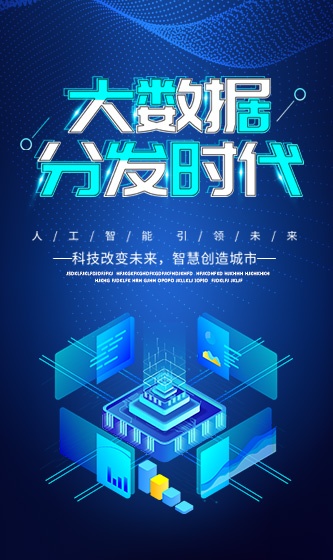
- 136氪首发 | 瞄准企业“流 3930
- 2失联37天的私募大佬现身,但 3220
- 3是时候看到全球新商业版图了! 2809
- 436氪首发 | 「微脉」获1 2759
- 5流浪地球是大刘在电力系统上班 2708
- 6招商知识:商业市场前期调研及 2698
- 7Grab真开始做财富管理了 2610
- 8中国离硬科幻电影时代还有多远 2328
- 9创投周报 Vol.24 | 2186
- 10微医集团近日完成新一轮股权质 2181

